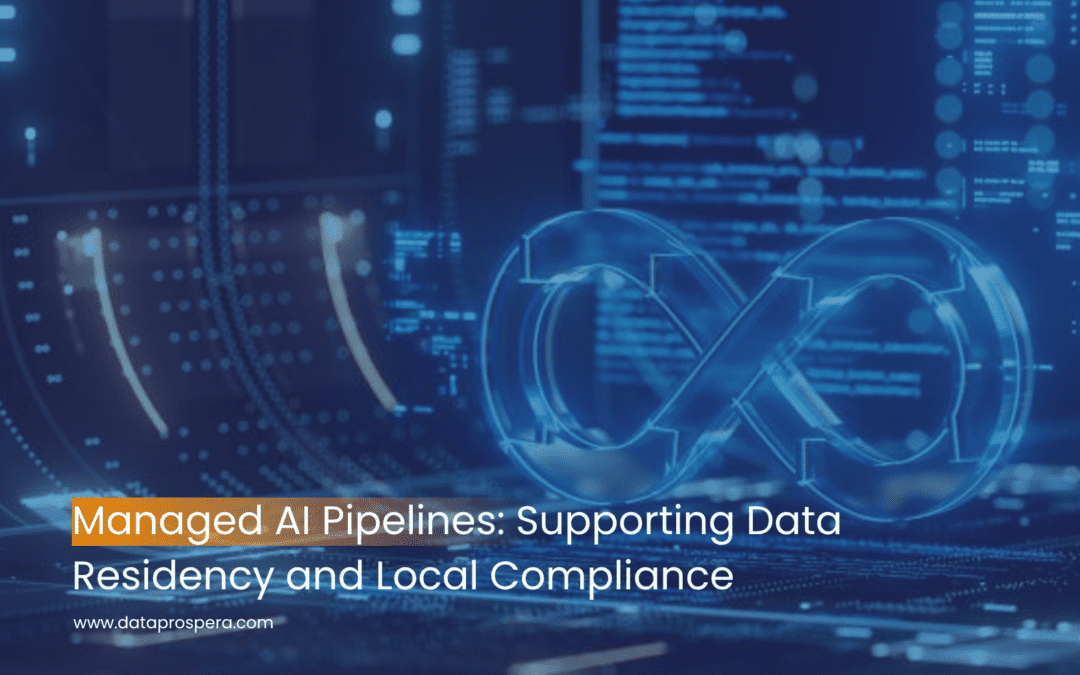As organizations adopt artificial intelligence (AI) at scale, one of the biggest challenges they face isn’t just training accurate models or managing infrastructure—it’s maintaining compliance with local data regulations. From Indonesia’s Personal Data Protection (PDP) Law to Europe’s GDPR and India’s Data Protection Bill, data residency requirements are becoming a defining feature of enterprise technology strategy.
Managed AI pipelines offer a scalable, secure, and compliant way to deploy AI applications while respecting jurisdictional boundaries and regulatory expectations.
What Are Managed AI Pipelines?
A managed AI pipeline is an end-to-end automated workflow that handles the ingestion, processing, training, deployment, and monitoring of machine learning (ML) models—all maintained by a trusted managed service provider. When designed with data residency and sovereignty in mind, these pipelines help organizations stay within the legal boundaries of where and how data is stored, processed, and transferred.
Key Components:
- Data ingestion and preprocessing within local jurisdictions
- Model training in region-specific environments
- Storage and logging in-country or on-prem infrastructure
- Monitoring and governance with audit trails aligned to compliance frameworks
The Compliance Advantage
Traditional cloud AI deployments often struggle with regional compliance, especially when data must stay within national borders. Managed AI pipelines offer distinct advantages:
- Data Sovereignty Assurance: Ensure personal or sensitive data never leaves its legal territory.
- Policy Enforcement: Built-in access control and encryption standards that align with local and industry-specific regulations.
- Automated Auditing: Real-time compliance checks and audit-ready logging.
Explore how your business can better navigate regulatory complexity in our blog: Implementing Zero Trust with AI & Analytics
Supporting Use Cases
- Healthcare: Patient data remains within country borders while enabling AI-assisted diagnostics.
- Financial Services: AI models for fraud detection trained on localized data to comply with OJK and BI regulations.
- Government: Public sector initiatives powered by AI, without sending citizen data offshore.
For real-world applications, see: AI for Public Sector Innovation: Smarter Governance
On-Prem vs. Cloud: Hybrid Approaches
Organizations often deploy hybrid architectures where sensitive data is processed on-prem, while non-sensitive tasks utilize public cloud resources. Managed AI pipelines can orchestrate such architectures seamlessly, helping businesses reduce cost without compromising compliance.
Read more: Cloud vs On-Premise: Choosing the Right IT Infrastructure
Future Outlook: Federated and Confidential Learning
The next evolution of data-residency-compliant AI includes techniques like:
- Federated Learning: Training models across distributed data sources without centralizing the data
- Confidential Computing: Securely processing encrypted data in-memory to protect sensitive information during computation
These innovations allow global AI capabilities while upholding local regulations.
Related: Federated Learning: Collaborative AI Across Borders
Conclusion
As AI becomes central to enterprise transformation, data residency and compliance cannot be an afterthought. Managed AI pipelines provide the tools and governance required to innovate responsibly and legally.
Enterprises that align their AI strategies with local regulations will gain more than compliance—they will earn the trust of customers, regulators, and partners.
Ready to implement secure, scalable, and compliant AI pipelines? Contact Dataprospera for custom solutions that support your industry and regulatory needs.


Recent Comments